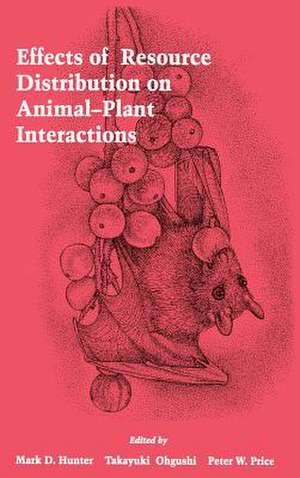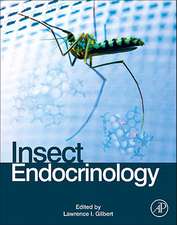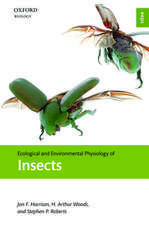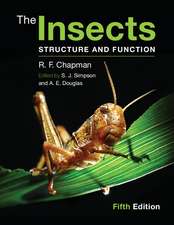Effects of Resource Distribution on Animal Plant Interactions
Editat de Mark D. Hunter, Takayuki Ohgushi, Peter W. Priceen Limba Engleză Hardback – 23 feb 1992
Preț: 567.76 lei
Preț vechi: 737.35 lei
-23% Nou
Puncte Express: 852
Preț estimativ în valută:
108.64€ • 114.04$ • 90.17£
108.64€ • 114.04$ • 90.17£
Carte tipărită la comandă
Livrare economică 10-24 aprilie
Preluare comenzi: 021 569.72.76
Specificații
ISBN-13: 9780123619556
ISBN-10: 0123619556
Pagini: 505
Dimensiuni: 152 x 229 x 28 mm
Greutate: 0.92 kg
Editura: ELSEVIER SCIENCE
ISBN-10: 0123619556
Pagini: 505
Dimensiuni: 152 x 229 x 28 mm
Greutate: 0.92 kg
Editura: ELSEVIER SCIENCE
Public țintă
Researchers and graduate students in animal population biology, and evolutionary, community, and theoretical ecology.Cuprins
M.D. Hunter and P.W. Price, Introduction: Plants as a Variable Resource Base for Animals. M.C. Rossiter, The Impact of Resource Variation on Population Quality in Herbivorous Insects: A Critical Aspect of Population Dynamics. R.S. Ostfeld, Small Mammal Herbivores in a Patchy Environment: Individual Strategies and Population Responses. A.E. Weis and D.R. Campbell, Plant Genotype: A Variable Factor in Insect-Plant Interaction. B.J. Rathcke, Nectar Distributions, Pollinator Behavior, and Plant Reproductive Success. P.W. Price, Plant Resources as the Mechanistic Basis for Insect Herbivore Population Dynamics. J.C. Schultz, Factoring Natural
Enemies into Plant Tissue Availability to Herbivores. T. Ohgushi, Resource Limitation on Insect Herbivore Populations. J.R. Karr, M. Dionne, and I. Schlosser, Bottom-Up versus Top-Down Regulation of Vertebrate Populations: Lessons from Birds and Fish. M.D. Hunter, Interactions Within Herbivore Communities Mediated by the Host Plant: The Keystone Herbivore Concept. D.W. Roubik, Loose Niches in Tropical Communities: Why Are There So Few Bees and So Many Trees? T.H. Fleming, How Do Fruit-and-Nectar Feeding Birds and Mammals
Track Their Food Resources? T. Inoue and M. Kato, Inter-and Intraspecific Morphological Variation in Bumblebee Species, and Competition in Flower Utilization. J.M. Scriber and R.C. Lederhouse, The Thermal Environment as a Resource Dictating Patterns of Feeding Specialization of Insect Herbivores. Each chapter includes references. Index.
Enemies into Plant Tissue Availability to Herbivores. T. Ohgushi, Resource Limitation on Insect Herbivore Populations. J.R. Karr, M. Dionne, and I. Schlosser, Bottom-Up versus Top-Down Regulation of Vertebrate Populations: Lessons from Birds and Fish. M.D. Hunter, Interactions Within Herbivore Communities Mediated by the Host Plant: The Keystone Herbivore Concept. D.W. Roubik, Loose Niches in Tropical Communities: Why Are There So Few Bees and So Many Trees? T.H. Fleming, How Do Fruit-and-Nectar Feeding Birds and Mammals
Track Their Food Resources? T. Inoue and M. Kato, Inter-and Intraspecific Morphological Variation in Bumblebee Species, and Competition in Flower Utilization. J.M. Scriber and R.C. Lederhouse, The Thermal Environment as a Resource Dictating Patterns of Feeding Specialization of Insect Herbivores. Each chapter includes references. Index.
Recenzii
"It is likely that anyone interested in the issues of population limitation and regulation of herbivore community assemblage in terrestial systems will find 'meat for thought' here." --ECOLOGY
"This book would serve as an excellent basis for a graduate-level course in plant-animal interactions...Most authors have made synthetic arguments and presented new hypotheses. Because of this effort, most of the chapters retain a freshness that engage the reader's interest and stimulates further discussion." --TREE
"This book would serve as an excellent basis for a graduate-level course in plant-animal interactions...Most authors have made synthetic arguments and presented new hypotheses. Because of this effort, most of the chapters retain a freshness that engage the reader's interest and stimulates further discussion." --TREE













